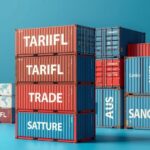Politics
ASHIK CHOWDHURY, ASIA, BANGLADESH, BANGLADESH INVESTMENT DEVELOPMENT AUTHORITY, BASH, CA, CAMBODIA, CHINA, DHAKA, EXPORTS, FOREIGN INVESTMENT, INDIA, INTERNATIONAL TRADE, JAMUNA, MEXICO, MUHAMMAD YUNUS, NORTH AMERICA, PAKISTAN, SRI LANKA, SUPPLY CHAIN, TRADE, UNITED STATES, US, VIETNAM, WASH, WASHIGTON, WASHINGTON
Dante Raeburn
Bangladesh to Appeal New US Tariff Amid Trade Deficit Concerns
Bangladesh will appeal the new US 37 percent reciprocal tariff on exports, aiming to reduce its trade deficit by increasing imports. Chief adviser Muhammad Yunus will discuss the matter with US officials, addressing both the immediate issue and long-term reforms relating to customs and intellectual property rights. The tariff alters the global trade landscape, prompting careful reassessment and strategic responses from Bangladesh.
Bangladesh intends to seek an appeal regarding the newly established reciprocal tariff by the United States, which is part of a broader global trade discussion. To counterbalance the trade deficit that has prompted the tariff, Dhaka plans to increase imports from the US. Chief adviser Muhammad Yunus will engage directly with US officials to address the situation, as confirmed by high representative Khalilur Rahman.
This strategy follows an emergency meeting held at the state guest house Jamuna, just two days following the US’s imposition of a 37 percent tariff on Bangladeshi exports. Khalilur Rahman emphasized that such a tariff was anticipated rather than unexpected, indicating prior discussions on the issue with US officials during a visit in February.
Currently, the majority of Bangladeshi exports to the United States, primarily readymade garments, are subjected to a 15 percent tariff. In the previous year, Bangladeshi goods exported to the US totaled approximately $8.4 billion, with garments accounting for $7.34 billion. The trade deficit with the US stands at $6.2 billion based on $2.2 billion in US exports to Bangladesh.
In light of the new tariff, Bangladesh aims to shift its import sources for essential commodities, which include primary energy, soya beans, metal scrap, cotton, and capital machinery, in an effort to mitigate a trade gap exceeding $6 billion. The commerce adviser acknowledged that this new tariff policy presents both challenges and opportunities for the nation.
Additionally, discussions include addressing US concerns through comprehensive reforms related to customs and intellectual property rights. The baseline tariff policy has already taken effect, initiating a shift in the long-standing post-World War II mutually agreed tariff rate system. The executive chairman of the Bangladesh Investment Development Authority suggested a careful approach to the appeal process, ensuring thorough consultations with relevant stakeholders.
In summary, Bangladesh is poised to challenge the newly imposed US tariffs by increasing imports and engaging in dialogue with US officials. The country seeks to address the significant trade deficit and adapt its import strategies to confront the implications of the 37 percent tariff. By fostering reforms and maintaining proactive communication with the US, Bangladesh aims to find opportunities amid the challenges presented by this tariff policy.
Original Source: www.newagebd.net








Post Comment